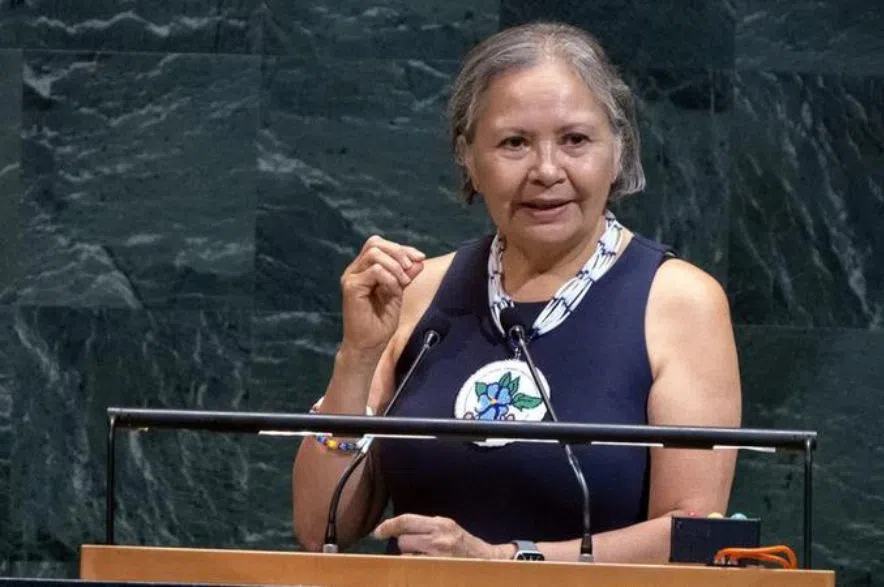By
A Saskatchewan woman who has been a longtime advocate for Indigenous rights, mental health and trauma-informed care has won a prestigious award from the United Nations.
Brenda Reynolds is one of two people to be given the Nelson Mandela Award, which is only handed out every five years to recipients who reflect the South African leader’s legacy. It is given to one man and one woman, but one of them must be from Africa.
Read more:
- Indigenous leaders say federal budget falls short on health care, education
- Listen to Meeting Ground with David Kirton
- Lack of ER support tops health complaints list for First Nations patients
“I was just completely, completely honoured to be selected and, for a prize under his name. To be awarded it and being from a reserve in Saskatchewan, from Fishing Lake, is just absolutely unbelievable and extraordinary,” said Reynolds.
She first became known for her advocacy in 1988, when she helped 17 teenage girls in the first residential school sexual abuse case in Saskatchewan at George Gordon First Nation.
“Back in 1988, when I was first working with students at Gordon’s Indian Residential School when it was still open, there were 17 girls that disclosed to me and the RCMP constable that they were being sexually abused by a staff member,” Reynolds said.
That led to the very first charge of abuse in a residential school in Saskatchewan, which in turn led to the largest class action lawsuit in Canada, the Indian Residential School Settlement, and that led to her being named a special advisor to the Truth and Reconciliation Commission where she helped shape survivor support and trauma responses.
She has also developed a health support program from that experience, which provides culturally-grounded mental health care for residential school survivors and their families.
It was the first of its kind in the world.
Breaking new ground is still not in Reynolds’ past. She is the first Canadian and the first Indigenous person in the world to get the Mandela Award.
“Brenda is the first Indigenous person to receive this award,” said Betty Nippi-Albright, a Saskatoon MLA and Saskatchewan NDP critic for mental health and addictions. She hosted a reception in Reynolds’ honour on Nov. 6 in Regina.
“She is an inspiration to us all. I’m sure I can speak for everyone when I say I can’t wait to see what Brenda does next,” said Nippi-Albright.
The selection committee included Philemon Yang, President of the General Assembly, and representatives from Egypt, Finland, Poland, Bahrain and the permanent representative from South Africa, Mandela’s home country.
“To be recognized for that was really, really amazing because I’ve always admired Nelson Mandela and the work it is that he has done in terms of peace and reconciliation. Not only that, but the way that he did it was just admirable,” Reynolds said.
Reynolds said she has always seen a lot of parallels between South Africa and Canada and that has helped the award resonate with her.
Reynolds is a status treaty member of the Fishing Lake Saulteaux First Nation, which is southeast of Humboldt.
Reynolds grew up on a reserve and at age 66, her life’s work in her chosen field of social work has all been on one reserve or another. She still works on a reserve and is getting ready to defend her doctoral thesis.
Given her inevitable position as a role model for younger women, especially those living on reserves like she has done, Reynolds has some words of advice based on her own childhood influences.
“As a child I was already interested in human behaviour and trying to understand human behaviour. My grandmother Violet was the one that taught me about that. I swear she would have been a psychologist if she was even allowed to go to university at the time.”
Follow your curiosity, is her message.
“It’s in the understanding of why and how it is that we live as Indigenous people that has led me to what it is I have done, so follow your curiosity, ask questions and learn.”
Being a life-long learner is a valuable trait and one she takes to heart, pursuing her doctorate in her 60s.
“I’m 66 but I’m still in school. I’ll never stop learning. I really believe that following what it is that is interesting to you and don’t let any barriers prevent you from doing something it is that you’re interested in.”
In 2023, Reynolds was invited by the UN High Commissioner for Human Rights and the European Union to share her expertise on trauma and cultural genocide.
She shares the 2025 United Nations Nelson Rolihlahla Mandela Prize with Kennedy Odede, who went from living on the streets at age 10 in Kenya to becoming one of TIME Magazine’s 100 most influential people in 2024.
Read more:











